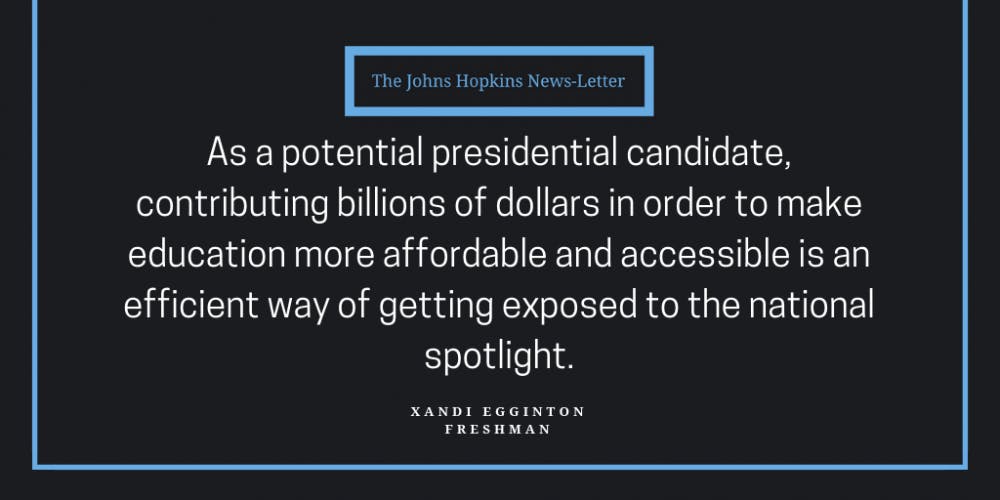Michael Bloomberg’s $1.8 billion gift to Hopkins is unparalleled. Never in history has an individual made such a generous donation to an institution and for such a good cause.
There is no doubt that Bloomberg has single handedly turned a page in our University’s history for the better, and we have much to thank him for that. That being said, I believe it’s our obligation as Hopkins students to identify all the factors that may have influenced Mr. Bloomberg’s gift.
Bloomberg is considering a run for the presidency in 2020. As a potential presidential candidate, contributing billions of dollars in order to make education more affordable and accessible is an efficient way of getting exposed to the national spotlight. One could go as far as saying that it was more of a political act than it was a concentrated attempt at evening the playing field for low and middle-income students across the nation.
Bloomberg attempted to make his gift as politically uncontentious as possible. He wrote about “qualified” and “high achieving” low and middle-income students in his op-ed. He highlighted the underlying values of his gift that many Americans believe in: that qualified people of all socioeconomic classes should be afforded an education. Bloomberg gave Hopkins this power, and, through his piece in the Times, he made sure that the world found out about it.
Mr. Bloomberg’s op-ed, unsurprisingly, is rich with sentiments of actualizing the American dream. As an undergrad, Bloomberg could only afford Hopkins through a National Defense student loan and an on-campus job. He wasn’t rich when he graduated either; his first donation to Hopkins was a mere $5. Bloomberg is the prototype of the philanthropist of humble roots who made it through perseverance and grit.
This is the kind of story that works well politically and garners a following. It’s why Bloomberg chose to be anecdotal in his piece. That being said, Bloomberg’s dedication to giving back to the institution that fostered his own growth in the past is admirable. Furthermore, Bloomberg has once again demonstrated his commitment to ensuring more equitable access to institutions of higher education, and he has set a precedent for the redistribution of resources from the hyper-wealthy to those that have been systematically deprived of opportunity. But giving $1.8 billion to Hopkins isn’t the most effective way of bringing about change for low and middle-income students.
There are many institutions of higher education in this nation that do a better job of supporting minority and low-income graduates. Many public universities in the country, like University of Maryland, Baltimore County (UMBC), has had more low-income, middle-income and minority students leave with MDs and Ph.Ds than prestigious private universities. More than Harvard. More than Princeton. More than Hopkins.
If Bloomberg, an economist, had chosen to optimize the efficacy of his gift, he would have given to an institution like UMBC or he would have diluted the money among many. These public universities aren’t necessarily underfunded, but they don’t have the cumulative wealth that Hopkins has. $1.8 billion at UMBC, any of the UCs or the University of Florida could arguably make a bigger difference in the education of low and middle-income students than at Hopkins.
But giving to UMBC — or spreading out the $1.8 billion between institutions of higher education around the country that have a history of devotion to the education of minority, low and middle-income students — wouldn’t have made as big of a national splash. There’s something majestic about the sheer size of Bloomberg’s gift and who he’s giving it to. It fits the political trajectory of his successful career, his politics and his anecdote of returning to his roots that he alluded to in his op-ed.
As Hopkins students, we should be incredibly grateful to Mr. Bloomberg. He has changed many of our lives and has permanently affected the lives of our future peers. We should be aware, though, that his donation may have ulterior motives. Should we hope to make higher education more accessible to those without significant means, there is much more work to be done and money to be spent elsewhere.
Xandi Egginton is a freshman from Baltimore. He plans to major in Political Science and Philosophy.





